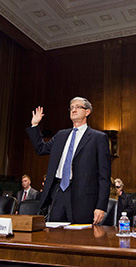 Seemingly minor bits of information collected by the National Security Agency, such as the phone numbers that citizens dial, can reveal far more personal information than is commonly believed, Princeton University professor and UW CSE Ph.D. alum Ed Felten told the U.S. Senate Judiciary Committee on Tuesday, Oct. 1.
Seemingly minor bits of information collected by the National Security Agency, such as the phone numbers that citizens dial, can reveal far more personal information than is commonly believed, Princeton University professor and UW CSE Ph.D. alum Ed Felten told the U.S. Senate Judiciary Committee on Tuesday, Oct. 1.
Felten said that searching for patterns in large collections of metadata “can now reveal startling insights about the behavior of individuals or groups.”
“It is no longer safe to assume that this ‘summary’ or ‘non-content’ information is less revealing or less sensitive than the contents it describes,” Felten said. “Just by using new technologies such as smart phones and social media, we leave rich and revealing trails of metadata as we move through daily life. Many details of our lives can be gleaned by examining those trails.”
Felten told the committee members that it was critical for legislators who make the laws and judges who review them to have a firm grasp of the technical implications of their decisions. He urged them to take advantage of the nation’s technological experts when grappling with the policy implications of advancing technology.
Felten – Professor of Computer Science and of Public Affairs at Princeton, Director of Princeton’s Center for Information Technology Policy, and first Chief Technologist of the Federal Trade Commission from 2001-12 – received the UW CSE Alumni Achievement Award in 2013. He is a Member of the National Academy of Engineering and a Fellow of the American Academy of Arts & Sciences.
Read more here.

